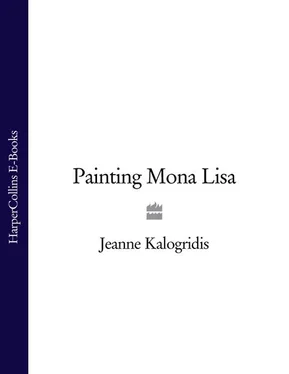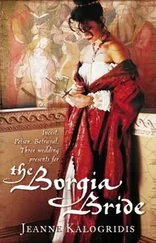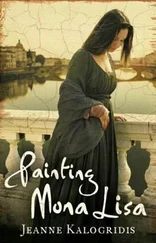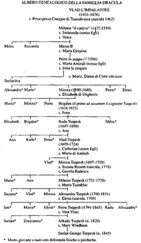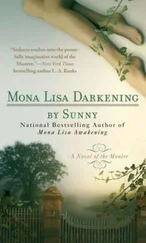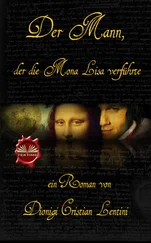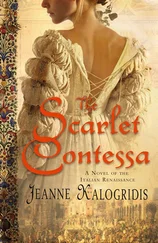Baroncelli paused. He was already half-mad, already doomed to Hell, so saw no point in suppressing any further urge towards deceit … and the sight of Giuliano moving so slowly, as though he were heavy laden, pricked at him. Feigning impulsiveness, he seized the young Medici and hugged him tightly. ‘Dear friend,’ he said. ‘It troubles me to see you so unhappy. What must we do to cheer you?’
Giuliano gave another forced little smile and a slight shake of his head. ‘Nothing, good Bernardo. Nothing.’
And he followed Francesco’s lead into the cathedral.
Baroncelli, meanwhile, had laid one more concern to rest: Giuliano wore no breastplate beneath his tunic.
IV Contents Cover Title Page JEANNE KALOGRIDIS Painting Mona Lisa Prologue: Lisa June 1490 I II PART I April 26, 1478 III IV V VI VII VIII December 28, 1478 IX X PART II LISA XI XII XIII XIV XV XVI XVII XVIII XIX XX XXI XXII XXIII XXIV XXV XXVI XXVII XXVIII XXIX XXX XXXI XXXII XXXIII XXXIV XXXV XXXVI XXXVII XXXVIII XXXIX XL XLI XLII XLIII XLIV XLV XLVI XLVII XLVIII XLIX L LI LII LIII LIV LV LVI LVII LVIII LIX LX LXI LXII LXIII LXIV LXV LXVI LXVII LXVIII LXIX LXX Epilogue: Lisa July 1498 LXXI Acknowledgements By the same author Copyright About the Publisher
On that late April morning, Giuliano faced a terrible decision: he must choose to break the heart of one of the two people he loved most in the world. One heart belonged to his brother, Lorenzo; the other, to a woman.
Though a young man, Giuliano had known many lovers. His former mistress, Simonetta Cattaneo, wife of Marco Vespucci, had been hailed as the most beautiful woman in Florence until her death two years ago. He had chosen Simonetta for her looks: she was fine-boned and fair, with masses of curling golden hair that fell far below her waist. So lovely was she that they had carried her to her grave with her face exposed. Out of deference for the husband and family, Giuliano had watched from a distance, but he had wept with them.
Even so, he had never been faithful. He had dallied with other women during their affair and, occasionally he had revelled in the talents of whores.
Now, for the first time in his life, Giuliano desired only one woman: Anna. She was handsome, to be sure, but it was her intelligence that had entrapped him, her delight in life and the greatness of her heart. He had come to know her slowly, through conversation at banquets, and at parties. She had never flirted, never attempted to win him; indeed, she had done everything possible to discourage him. But none of the dozens of Florentine noblewomen who vied and simpered for his affections matched her. Simonetta had been vapid; Anna had the soul of a poet, a saint.
Her goodness made Giuliano view his former life as repugnant. He abandoned all other women and sought only the company of Anna, yearned to please only her. He wished to marry her, to father her children and none other’s. Just the sight of her made him want to beg forgiveness for his past carnal indulgences. He longed for her grace more than God’s.
And it seemed like a miracle when she had at last confided her feelings: that God had created them for each other, and that it was His cruellest joke that she was already given to another man.
As passionate as Anna’s love was for him, her love of purity and decency, was even greater. She belonged to another, whom she refused to betray. She had admitted her feelings for Giuliano, but when he pursued her – when he cornered her alone during Carnival at his brother’s house and begged for her – she rejected him. Duty, she had said. Responsibility. She had sounded like Lorenzo, who had always insisted his brother make an advantageous match, and marry a woman who would add even more prestige to the family, and not disgrace.
Giuliano, accustomed to having whatever he wanted, tried to bargain his way around it. He pleaded with her to come to him in private – simply to hear him out. She wavered, but then agreed. They had met once, in the ground floor appartamento at the Medici palazzo. She had indulged his embraces, his kiss, but would go no farther. He had begged her to leave Florence, to go away with him, but she had refused.
‘He knows.’ Her voice had been anguished. ‘Do you understand? He knows, and I cannot bear to hurt him any longer.’
Giuliano was a determined man. Neither God nor societal convention gave him pause once he had made up his mind. For Anna, he was willing to give up the prospect of a respectable marriage; for Anna, he was willing to endure the censure of the Church, even excommunication and the prospect of damnation. It seemed a small price in order to be with her.
And so he had made a forceful argument: She should go with him to Rome, to stay in a family villa. The Medici had Papal connections; he would procure for her an annulment. He would marry her. He would give her children.
She had been torn, had put her hands to her lips. He looked in her eyes and saw the misery there, but he also saw a flicker of hope.
‘I don’t know, I don’t know,’ she had said, and he had let her return to her husband to make her decision.
The next day, he had gone to Lorenzo. Giuliano had wakened in the middle of the night and was unable to return to sleep. It was still dark – two hours before sunrise – but he was not surprised to see the light emanating from his brother’s antechamber. Lorenzo sat at his desk, with his cheek propped against his fist, scowling down at a letter he held close to the glowing lamp.
Nearby, another lamp cast light on the wall in front of him, where three large wooden panels had been propped – another artistic acquisition. Lorenzo had acquired them only a few weeks ago, from a family that owed him money; he was most excited about them because the artist, Uccello, was using the ‘new perspective’ to make the scenes appear more realistic.
Giuliano was not impressed. The panels depicted opposing armies at the very instant of their engagement. Banners fluttered in the sky; lances and swords were wielded; beautifully caparisoned horses reared and bared their teeth. They glorified Death. Giuliano could not understand how something as changeable and meaningless as politics should justify the killing of men and breaking of women’s hearts. The panels honoured a battle that had taken place a hundred years before, between Florentine and Sienese forces; many soldiers had died, but few today could remember their names, and no one cared why they had sacrificed themselves.
Giuliano returned his gaze to his brother. Normally Lorenzo would have glanced up, would have forced away the frown to smile, to utter a greeting; that day, however, he seemed in uncommonly ill sorts. No greeting came; Lorenzo gave him a cursory glance, then looked back at the letter. Its contents were apparently the cause of his bad humour.
Lorenzo could be maddeningly stubborn at times, overly concerned with appearances, coldly calculating when it came to politics, and at times dictatorial concerning how Giuliano should comport himself, and with whom he should allow himself to be seen. But he could also be enormously indulgent, generous, and sensitive to his younger brother’s wishes. Although Giuliano had never desired power, Lorenzo always shared information with him, they always discussed the political ramifications of every civic event. It was clear that Lorenzo loved his brother deeply, and would gladly have shared control of the city with him, had Giuliano ever shown an interest.
It had been hard for Lorenzo, to lose his father, and to be forced to assume power when so young. True, he had the talent for it; but Giuliano could see it wore on him. After nine years, the strain showed. Permanent creases had established themselves on his brow and shadows had settled beneath his eyes.
Читать дальше
